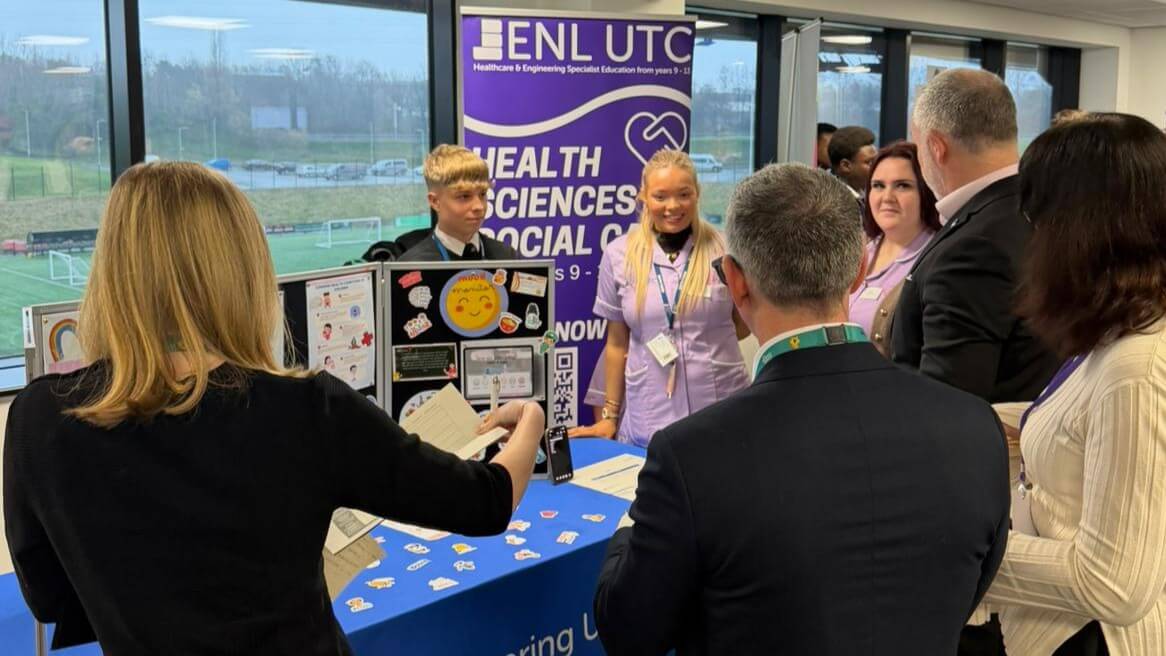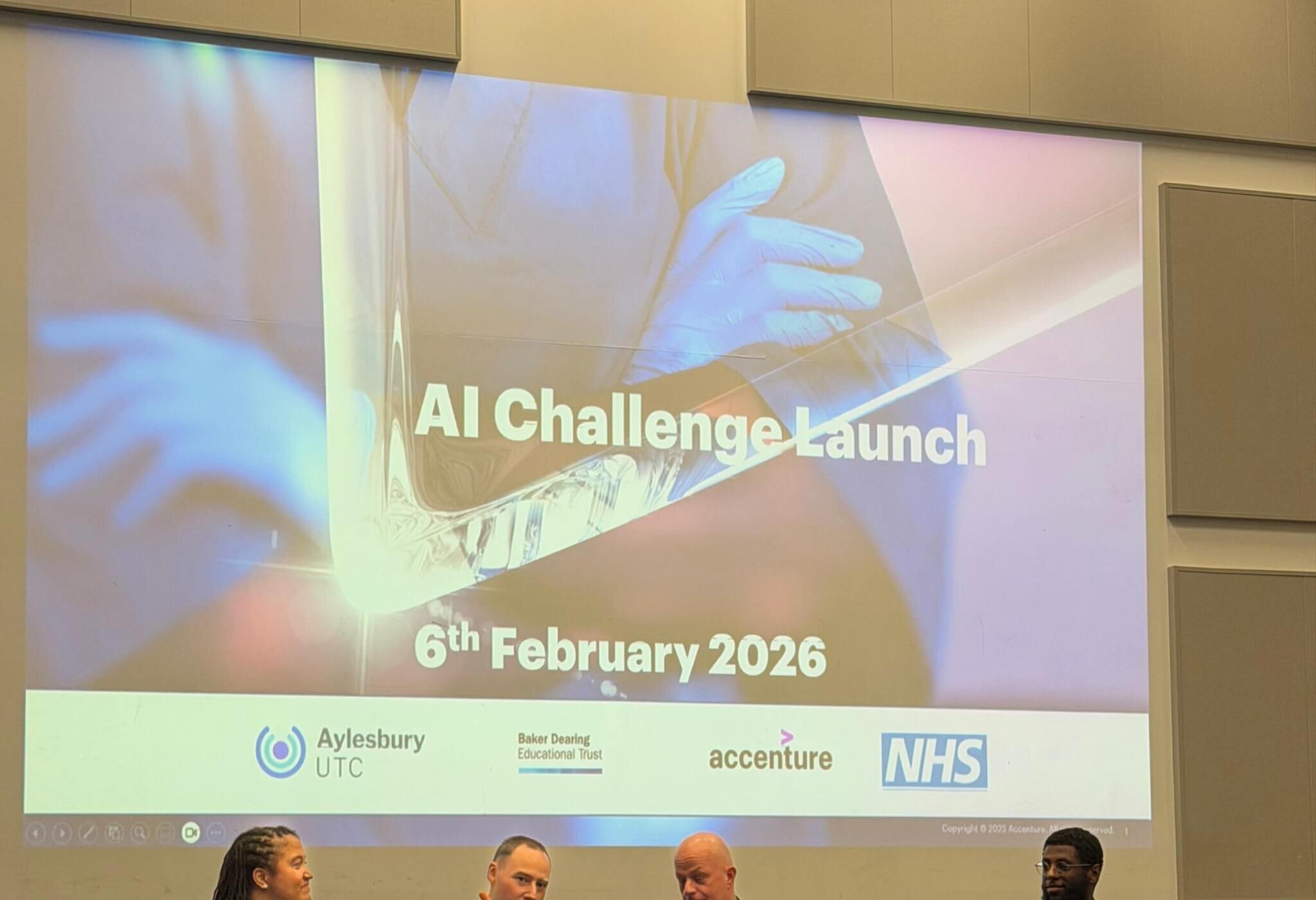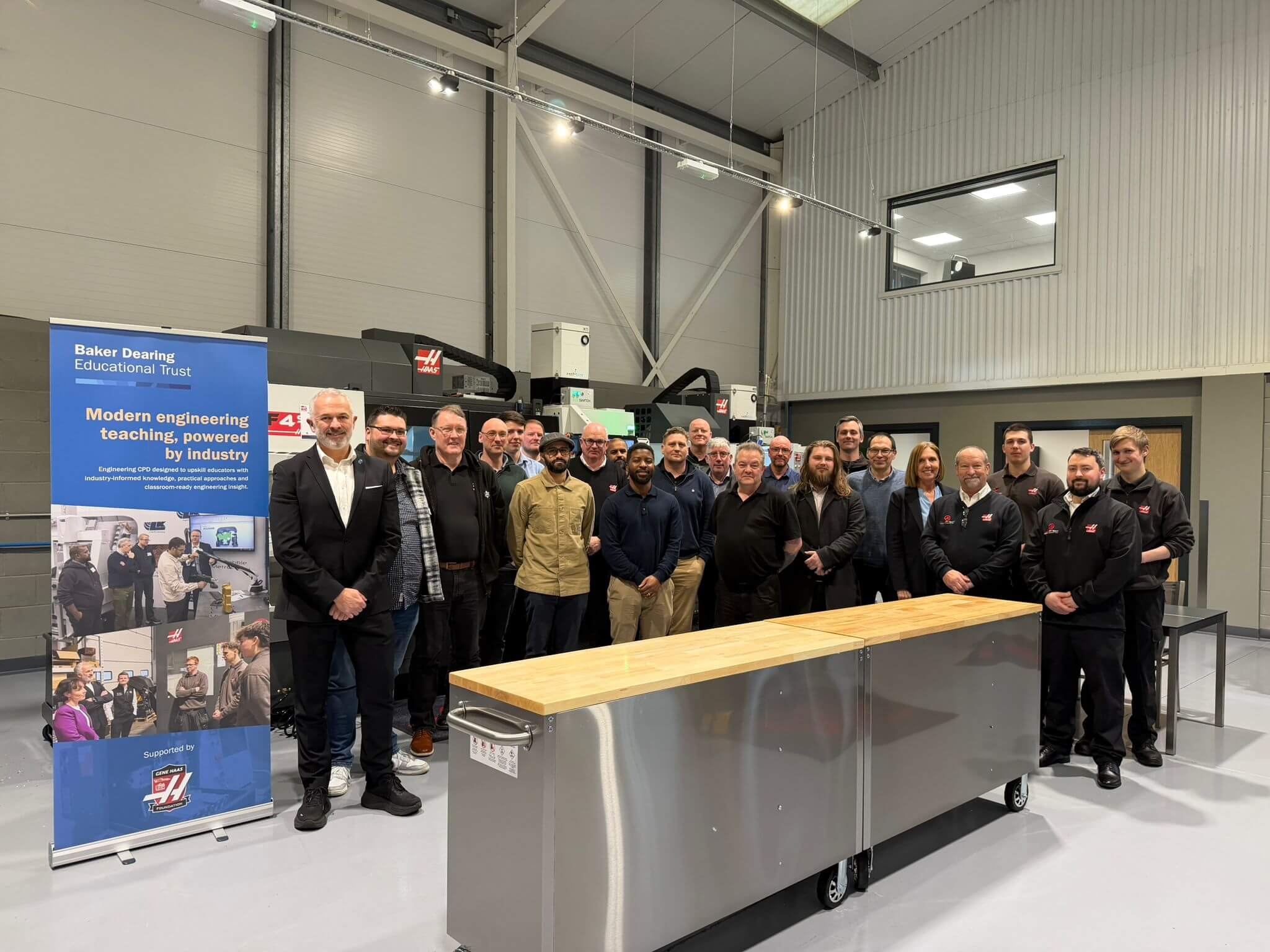|
For the latest edition of Baker Dearing’s newsletter for stakeholders in industry, politics, and the media The Blueprint, Baker Dearing’s new Chairman Stephen Phipson CBE, who is also Chief Executive of manufacturers’ trade organisation Make UK, was interviewed about what we would like to achieve in the new role, the role that UTCs can play in the industrial strategy, apprenticeship funding, and how industry expects the UK economy to perform over the coming year. The interview is available below in a text format or it can be viewed as a video using the link below.
What were your impressions from meeting UTC staff and stakeholders at the UTC Winter Conference and House of Lords Tea Party and also from your visit to Aston University Engineering Academy this month?My impressions have been that it is a very dedicated group of people that are really motivated to more than just provide technical education to youngsters. Really it is about a movement and a real desire to change things and to improve things and to give opportunities to youngsters. I think that’s exactly what UTCs are all about. So I have been very impressed with the motivation and the enthusiasm of everyone that I’ve met so far. Including on my visit to Aston to see the UTC and the team. You could just tell from the whole atmosphere of the place just how positive it is, and I think that’s a great testament to the staff’s dedication to the UTC movement. |
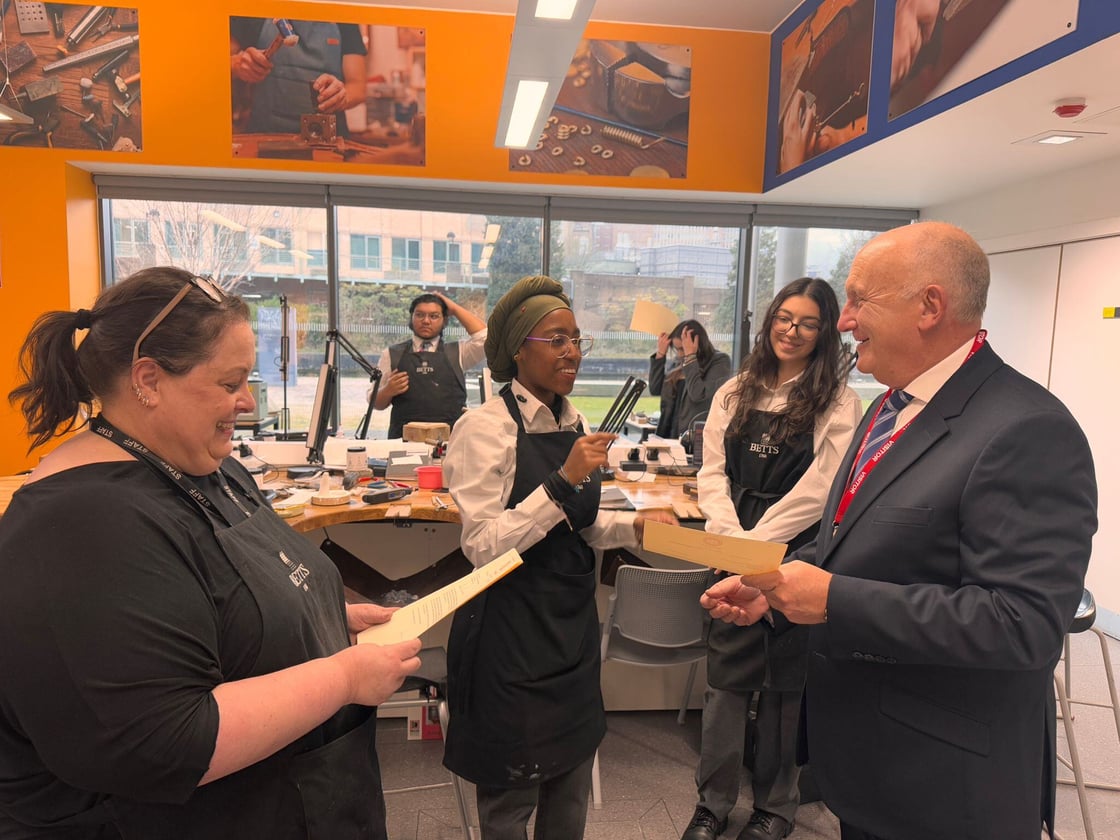 |
|
Stephen Phipson presenting letters of thanks from Lord Baker to AUEA students and staff who produced gifts for the former Chairman to mark his stepping into the Life President role. |
You said in your keynote to the conference that you want more employer engagement in the UTC programme. Can you elaborate on what that might look like?We have employers which are very engaged and understand the value of UTCs. But there is also a lot of other employers out there that actually need a bit more education about it, or need to understand and get enthused about it. A lot of it is place based, I’ve noticed as well. So it depends on where those employers are and what they’re doing and what the skill situation looks like in encouraging youngsters into the professions, particularly engineering and manufacturing. But every time I talk to an employer about UTC programme and the progress that we’ve seen so far, they are enthusiastic. So I think it’s about getting the message out to many more than the group we’ve got at the moment. I mean the group we have at the moment, once they’re in, they’re really enthusiastic, very, very supportive and our best advocates, so we can get more on board and move the programme forward. I think that’s the future. What do employers make of the industrial strategy that the government published in October?The industrial strategy is a fantastic opportunity to bring together the resources of the skills agenda in general, which includes the whole technical education programme, the apprentice programmes, and the university programmes, then convening them around some key objectives for the next 10 years. We’ve got some very large… you can call them challenges or opportunities. The net zero transition, for example, will create hundreds of thousands of new engineering jobs in this country. If we do it right, we can keep that onshore and grow what we’re doing locally in the UK and grow those good quality jobs and really create those opportunities for our youngsters to come through into those professions. But we’ve got to convene everything into a plan that sets out clearly what those priorities are and that’s what the industrial strategy is all about. Because otherwise government goes off in all different directions, with different departments having different agendas, and we we miss out on inward investments and all the other things. Now is our unique opportunity to really put things on a very clear footing for the next 10 year period. It’s important we keep mentioning 10 years because it’s on a statutory basis, it’s outside the parliamentary cycle. So it’s not subject to constant political chop and change as we’ve seen before and everyone’s very excited about that. But obviously we’ve got to work hard to make sure that happens. We’re in the consultation phase at the moment and the strategy draft is due out at the Spending Review, whenever that happens, which I think is going to be sometime in the summer. But at the moment, the government has had 3,000 submissions in from many, many stakeholders in all different areas around the industrial strategy. We’re all working very closely with government to try to set out what those priorities are going to be over the short term, so it’s a great opportunity for this country. Something else that you’ve talked about are apprenticeship funding bands being a problem for industry. Is that still the case?It’s still the case, and it’s one of the agenda items that we want to see Skills England address as a matter of urgency. If we look back to when the apprenticeship levy system was introduced in 2016 and the funding bands set then for engineering and manufacturing type apprenticeships, those bands have remained the same ever since. As we all know, since 2016, we’ve had quite a large increase in the cost of living and the cost of doing business, in energy costs and all sorts of things. And none of that funding has kept pace. Subsequently, we have seen a lot of providers dropping out because, effectively, they’re losing money every time they take on an apprentice. We need to get the decline in engineering apprenticeship starts reversed because a lot of the learners in the UTC programmes will end up on those apprenticeships and we need to make sure that provision exists for them to progress to that next level. |
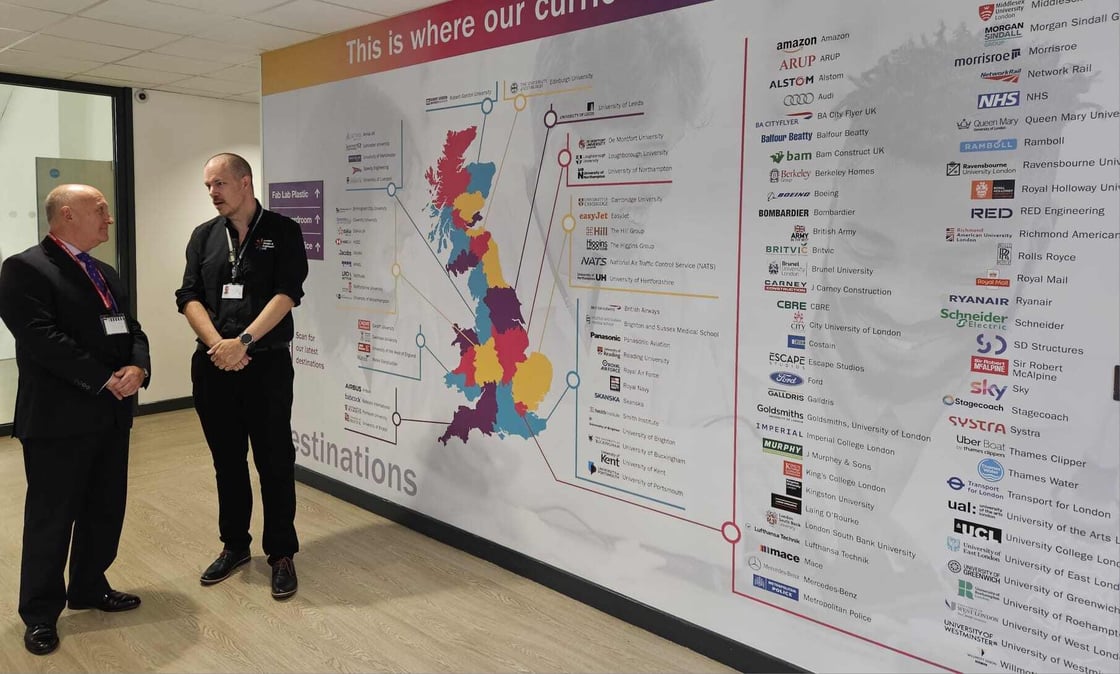 |
|
Stephen Phipson, pictured before he was appointed Chairman, on a visit to London Design and Engineering UTC, speaking with Chief Technology Officer James Culley. |
The rising cost of labour, which has been most recently affected by the increase in employer National Insurance contributions, is another issue for industry. Do you think that under-19 apprenticeship starts and the industrial strategy could be affected by this rising cost?I think it’s a short term issue. I think we are certainly going to see a dampening effect from the rise in employment costs this year, particularly as the increase in employer National Insurance contributions comes in April. We’ll see this year everyone readjusting and limiting investments, cutting money, they’ll be hiring fewer people, they’ll be freezing salaries and then we’ll get through that and be back on to growth. So I think what it’s done is dampened growth for this year. If we look at the surveys and and from various different institutions, including Make UK’s, they would say that yes, it’s tough for the short term, but everyone’s remaining optimistic for the medium and long term that growth is going to come back into the system and they’ll be able to reinvest again, but we just have to get through this first period. So this year, maybe it’s going to be dampened, but hopefully we can recover after that. If you think about training skills, if you think about education, that’s a longer-term pursuit, rather than the short-term problems of cost reduction. For this year, it might be quite difficult. After that, we’ll be back into growth again. I know that Make UK released its executive survey recently, which said that employers expect to see growth return and that the UK is a positive place to invest. Can you talk in more detail about that?Everyone’s interested in the industrial strategy and where we’re going. Basically, there’s a lot of inward investment, a lot of our large corporates are owned by foreign corporations effectively, and they have choices as to where they invest for their next factory and their next manufacturing business. The UK has been on hold waiting for this strategy to come through so they can see where we’re going in the longer term. The strategy is a way of unlocking growth and inward investment in the country, which I think is important. We’ve now got that and there is a trend at the moment of localisation, where many of the large companies are looking at bringing their supply chains closer to home due to all the geopolitical risks, which could create more and more supply chain jobs. That needs feeding with the right skills and the right people coming through to deliver it. It’s going to be a big driver of why UTCs are so important for the future, because we need those youngsters on those technical pathways to get into these jobs of the future. Then we’ve got the net zero transition. I know we keep playing around with the deadlines a little bit, but there’s no doubt the path is set that we’re going to have to create a lot of new industries in this country, around everything from hydrogen to wind turbine production to grid expansion to carbon capture. All of which are going to create thousands of new types of engineering jobs and manufacturing jobs in this country and that’s where people want to invest. So I think that that the macro situation, the trends are set for the longer term, it’s a matter of filling in the details to get that pathway to growth. I think with a proper industrial strategy, we’re going to see an opportunity for people to come in and invest in this country, and grow those bases and then the demand for technical education is going to be stronger than ever. |


